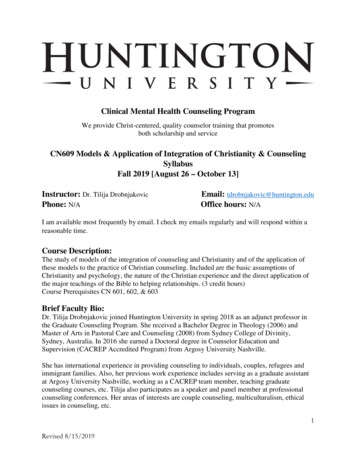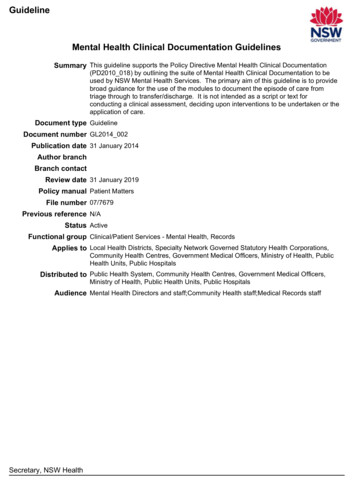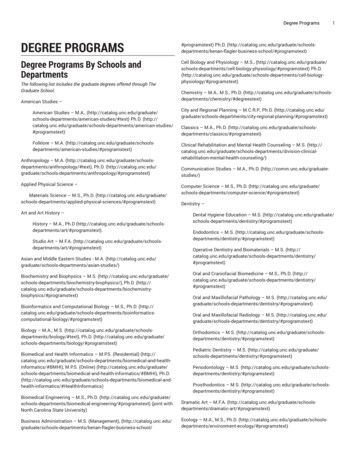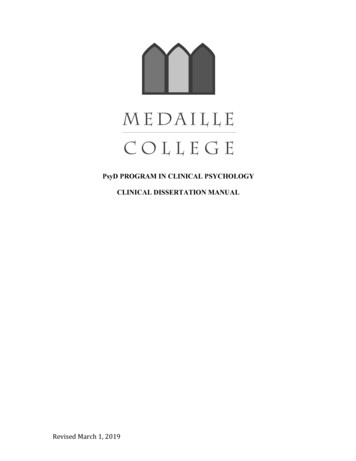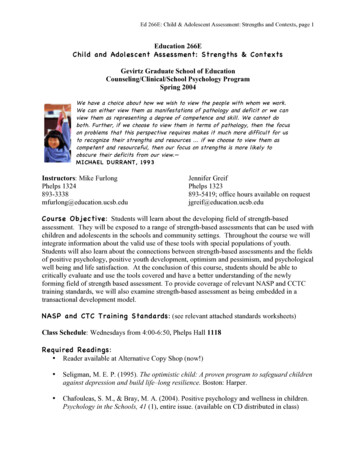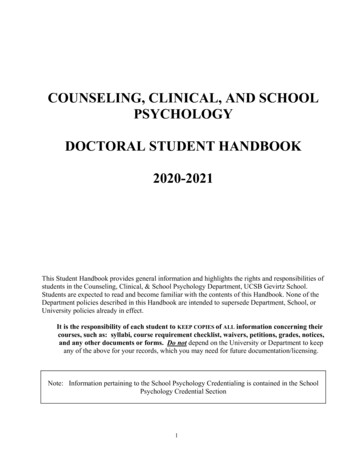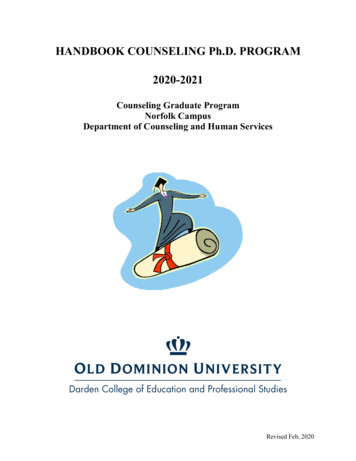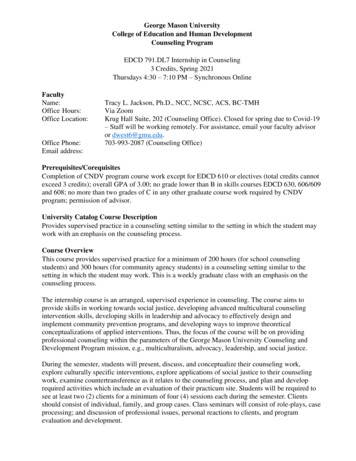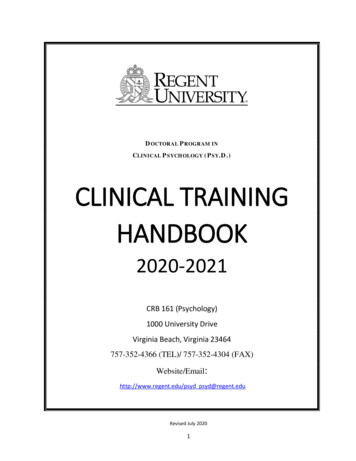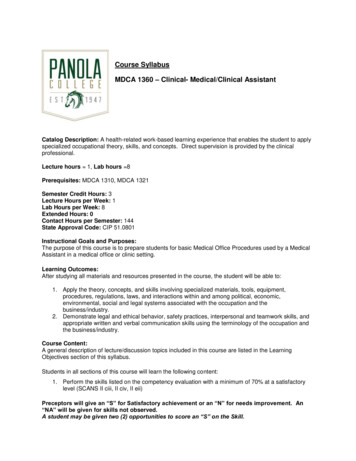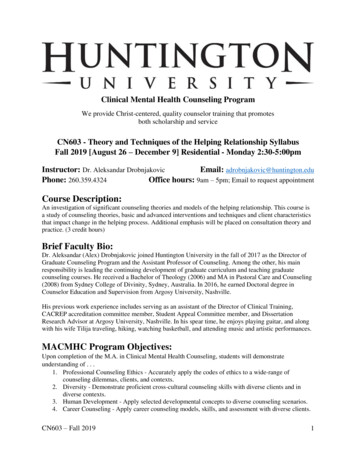
Transcription
Clinical Mental Health Counseling ProgramWe provide Christ-centered, quality counselor training that promotesboth scholarship and serviceCN603 - Theory and Techniques of the Helping Relationship SyllabusFall 2019 [August 26 – December 9] Residential - Monday 2:30-5:00pmInstructor: Dr. Aleksandar DrobnjakovicEmail: adrobnjakovic@huntington.eduPhone: 260.359.4324Office hours: 9am – 5pm; Email to request appointmentCourse Description:An investigation of significant counseling theories and models of the helping relationship. This course isa study of counseling theories, basic and advanced interventions and techniques and client characteristicsthat impact change in the helping process. Additional emphasis will be placed on consultation theory andpractice. (3 credit hours)Brief Faculty Bio:Dr. Aleksandar (Alex) Drobnjakovic joined Huntington University in the fall of 2017 as the Director ofGraduate Counseling Program and the Assistant Professor of Counseling. Among the other, his mainresponsibility is leading the continuing development of graduate curriculum and teaching graduatecounseling courses. He received a Bachelor of Theology (2006) and MA in Pastoral Care and Counseling(2008) from Sydney College of Divinity, Sydney, Australia. In 2016, he earned Doctoral degree inCounselor Education and Supervision from Argosy University, Nashville.His previous work experience includes serving as an assistant of the Director of Clinical Training,CACREP accreditation committee member, Student Appeal Committee member, and DissertationResearch Advisor at Argosy University, Nashville. In his spear time, he enjoys playing guitar, and alongwith his wife Tilija traveling, hiking, watching basketball, and attending music and artistic performances.MACMHC Program Objectives:Upon completion of the M.A. in Clinical Mental Health Counseling, students will demonstrateunderstanding of . . .1. Professional Counseling Ethics - Accurately apply the codes of ethics to a wide-range ofcounseling dilemmas, clients, and contexts.2. Diversity - Demonstrate proficient cross-cultural counseling skills with diverse clients and indiverse contexts.3. Human Development - Apply selected developmental concepts to diverse counseling scenarios.4. Career Counseling - Apply career counseling models, skills, and assessment with diverse clients.CN603 – Fall 20191
5. Counseling Models - Develop a sufficient counseling model for working a broad range of clients.6. Counseling Skills - Demonstrate proficient counseling skills in working with a broad range ofclients.7. Group Work - Demonstrate proficient leadership skills in the facilitation of a group.8. Assessment - Design and conduct several selected assessment processes for counseling scenarios.9. Research - Design counseling-oriented research or program evaluation.10. Integration - Develop an initial, integrated counseling model. Evidenced ethical integration ofChristian faith in working with diverse clients and in diverse contexts.11. Spiritual Formation - Develop a secure attachment with God.Student Learning Outcomes (SLO):Upon completion of this course, students should be able to:1. gain an awareness of counseling and consultation theories, their research and practical application2. gain an awareness of various helping techniques, their research (including evidenced-basedpractices), conceptualization, application, and have opportunity to practice these techniques withclients3. gain an understanding into what client characteristics and systems influence the helping process,including understanding of and promoting access to community-based resources4. gain an understanding of treatment plans and measurable outcomes that are developmentallyrelevant to clients5. gain an understanding of crisis intervention, trauma-informed, and community-based strategies(including suicide education and prevention)6. gain an understanding of ethical and culturally relevant strategies for establishing and maintainingin-person and technology-assisted counseling relationships7. begin to develop a philosophy of counseling that includes an understanding of the client and thechange process8. gain an understanding of how to practice counseling and consultation with the integration of faith,values, ethics and integrity.The following CACREP standards are addressed in this course:CACREP II.F.5.a-l, n; 5.C.1.b-c, 5.C.2.b, j, l1. theories and models of counseling (CACREP II.F.5.a)2. a systems approach to conceptualizing clients (CACREP II.F.5.b)3. theories, models, and strategies for understanding and practicing consultation (CACREPII.F.5.c)4. ethical and culturally relevant strategies for establishing and maintaining in-person andtechnology-assisted relationships (CACREP II.F.5.d)5. the impact of technology on the counseling process (CACREP II.F.5.e)6. counselor characteristics and behaviors that influence the counseling process (CACREPII.F.5.f)7. essential interviewing, counseling, and case conceptualization skills (CACREP II.F.5.g)8. developmentally relevant counseling treatment or intervention plans (CACREP II.F.5.h)9. development of measurable outcomes for clients (CACREP II.F.5.i)10. evidence-based counseling strategies and techniques for prevention and intervention(CACREP II.F.5.j)11. strategies to promote client understanding of and access to a variety of community-basedresources (CACREP II.F.5.k)CN603 – Fall 20192
12. suicide prevention models and strategies (CACREP II.F.5.l)13. crisis intervention, trauma-informed, and community-based strategies, such as PsychologicalFirst Aid (CACREP II.F.5.m)14. processes for aiding students in developing a personal model of counseling (CACREPII.F.5.n)15. theories and models related to clinical mental health counseling (CACREP 5.C.1.b)16. principles, models, and documentation formats of biopsychosocial case conceptualization andtreatment planning (CACREP 5.C.1.c)17. etiology, nomenclature, treatment, referral, and prevention of mental and emotional disorders(CACREP 5.C.2.b)18. cultural factors relevant to clinical mental health counseling (CACREP 5.C.2.j)19. legal and ethical considerations specific to clinical mental health counseling (CACREP5.C.2.l)Required Course Texts and ReadingsStudents are responsible for acquiring the following books and materials for this course by thetime the course begins:American Psychiatric Association. (2013). Diagnostic and statistical manual of mental disorders(5th ed.). Arlington, VA: American Psychiatric Publishing. ISBN: 978-0890425633American Psychological Association. (2010). Publication manual of the American PsychologicalAssociation (6th ed.). Washington, DC: Author. ISBN: 9781433805615Wedding, D., Corsini, R. J. (2019). Current psychotherapies (11th ed.). Belmont, CA: ThomsonBrooks/Cole Cengage Learning. ISBN: 978-1305865754Recommended Readings and ResourcesAmerican Counseling Association (2014). ACA code of ethics. Alexandria, VA: Author.Retrieved from: thics.pdfAmerican Mental Health Counselors Association (2015). AMHCA code of ethics. Alexandria,VA: Author.Caplan, G. (1995). Types of mental health consultation. Journal of Educational & PsychologicalConsultation, 6(1), 7-21. DOI: 10.1207/s1532768xjepc0601 1.Carney, J. M., & Jefferson, J. F. (2014). Consultation for mental health counselors: Opportunitiesand guidelines for private practice. Journal of Mental Health Counseling, 36(4), 302-314.O’Leary, C. J. (2015). Person-centered couple and family therapy: The effects of an extra beat oftime. Person-Centered & Experiential Psychotherapies, 14(3), 236–247. 3Redekop, F., Luke, C., & Malone, F. (2017). From the couch to the chair: Applyingpsychoanalytic theory and practice in counseling. Journal of Counseling & Development,95(1), 100-109.Rodríguez-González, M., Schweer-Collins, M., Bell, C. A., Sandberg, J. G., & RodríguezNaranjo, C. (2018). Family functioning, family structure, and differentiation of self inheterosexual Spanish couples: An actor–partner analysis. Journal of Counseling &Development, 97(2), 209-219. DOI: 10.1002/jcad.12251CN603 – Fall 20193
Scott, D. A. (2015). Introduction and overview of consultation. Thousand Oaks, CA: Sage.Retrieved from ries/64976 Chapter 1.pdfVarunee Faii Sangganjanavanich, V. F., & Lenz, A. S. (2012). The experiential consultationtraining model. Counselor Education & Supervision, 51(4), 296-307. DOI:10.1002/j.1556-6978.2012.00022.x.Method of Instruction and Course RequirementsThis class includes course material supplementing and expanding on textbook knowledge, classdiscussion, case presentations, skill building exercises, and other teaching methods utilized to monitorand facilitate students’ self-awareness, professionalism, and the integration of academic and experientiallearning. Assignments include individual and/or group projects. Students are expected and encouraged toactively participate in this learning experience.1. Discussion Questions (DQ):Students are expected to engage in graduate level class participation that includes regular classattendance and involvement with peers through in-class discussions. Specifics of the week are givenwhich may include questions, articles to read and evaluate, online resources to review and/or videosto view as part of participation in the discussion forum. Students will write an initial DiscussionForum Post due by 11:59pm EST the Friday of the assigned week and will submit two responses toclassmates by 11:59pm EST on the Sunday of the assigned week. Initial posts should be between250-300 words. Response posts to at least two peers should be between 100-150 words each.Attachments are not permitted. Responses should include (respectful) critical analysis of the posts,seek additional clarification, generate further discussion, or provide additional perspectives forconsideration. Note: Out of respect for one another, when a peer responds with a question orprompting further reflection from you, ensure that you “close” the conversation with a response. Thismay mean that you end up posting more than the minimum requirements. Posts and videos will beevaluated for both content and APA format using the grading rubric below.Grading Rubric for Discussion QuestionsThoughtfulness of student’s reflection; writing flow or verbal expression; thoroughinclusion of each required component, per forum instructions.Correct use of the following: APA-style formatting (defined as: correct grammar,punctuation, and error-free spelling); references and citations, if required for postRespectful and engaging response posts to peers and “closure” in the initialconversation, per discussion forum instructions.Total:PointsAvailable622102. Weekly Reading Tests (WRT):Students will complete fourteen quizzes over all of the major theories in the Current Psychotherapytext. Quizzes are 20 multiple-choice questions and must be completed in the classroom. Each WRTis worth 20 points.3. Case Study (CS) [Interactive Group Presentation]:Students will respond to four case studies in the context of one or more of the theories from CurrentPsychotherapies. This will be a group/team interactive presentation. A general grading rubric for CSis below. The specific theory-related elements are included at the end of the syllabus in the Appendix.CN603 – Fall 20194
Case Study Grading RubricCriterion(CACREPStandardTheory approachand initialconcerns about thetheory.(2.F5.a)Does not meetexpectations(0-2)Insufficientinformation aboutapproaching the clientwith the theory andconcerns that might 5.g)Encouragementfrom thetheoretical pointof n abouttheory-related lifestyleassessment.Insufficientinformation aboutencouragement fromthe theoretical point ofview.Does not meetexpectations(0-2)Writing difficultywith severalgrammar, syntax,and/or APA Styleformatting errorsMeets expectations(3-5)Exceeds expectations(6-8)MaxPointsAdequate informationabout approaching theclient with the theory andconcerns that might beaddressed. Some details ofthe case study describedadequately.Adequate informationabout lifestyle assessment.Some details describedadequately.Adequate informationabout encouragementfrom the theoretical pointof view. Some detailsdescribed adequately.Meets expectations(3-4)Thorough informationabout approaching theclient with the theory andconcerns that might beaddressed. Many details ofthe case study describedthoroughly.Thorough informationabout lifestyle assessment.Many details describedthoroughly.Thorough informationabout encouragementfrom the theoretical pointof view. Many detailsdescribed thoroughly.Exceeds expectations(5-6)/8 pts.Adequate quality ofwriting with minimalgrammar, syntax, and/orAPA Style formattingerrorsExcellent quality ofwriting with few, if any,grammar, syntax, and/orAPA Style formattingerrors/6 pts.Total/8 pts./8 pts./30pts.4. Required Assignments (RA):Required Assignments (RAs) are substantive assignments intended to measure student performanceagainst selected course objectives and/or program outcomes within a course. Each RA contributes to asignificant portion of the overall course grade and is assessed by faculty using the grading criteriadesigned for that assignment. These are individual assignments and students earn individual grades.All RA grading rubrics are in the Appendix at the end of the syllabus.Logistics:Font: Times New RomanFont size: 12Length: 3-4 pages Title Page and Reference ListTyped: Double-spacedMargins: 1”Writing style: APA 6th ed.Scholarly articles: Utilize 3-4 peer review articles5. LASA [Philosophy of Counseling Paper]:A LASA is a signature assessment intended to measure student performance against selected courseobjectives and/or program outcomes within a course. These signature assessments contribute to asignificant portion of the overall course grade and is assessed by faculty using the rubric designed forthat assessment. These are individual assignments, and students earn individual grades.CN603 – Fall 20195
Paper Contents:1. Rationale for choosing theory/theories. How the theory/theories does/does not fit with yourworldview?2. Your understanding of human nature, human development, maladaptive thoughts, feelingsand behavior. What is your understanding of the nature of persons and how they develop andmature? Distinguish between healthy and unhealthy individuals and discuss how maladaptiveconditions develop (etiology).3. Your understanding of the goals of therapy, how clients’ change, and how the therapist andclient work together to bring about desired change. What are the goals of change in yourphilosophy of counseling? What do clients do to bring about the desired change? What is the roleof the therapist and the client to bring about your goals? What methods and techniques wouldyou use to bring these changes about?4. Multicultural and ethical considerations. Explain the inclusion or lack of ethical and culturalfactors in counseling.5. Critique of the theory/theories. Explain strengths and limitations of the chosen theory/theories.Paper Logistics:1. 10 to 12 double-spaced pages2. Minimum of 8-10 sources (each chapter used from Wedding and Corsini count as one source).The Bible is also an acceptable source.3. Defend sections 2-3 from a psychological and theological perspective4. APA style and format5. Use headings for each major section (bold sentences above) of your paperLASA [Philosophy of Counseling Paper] Grading Rubric(300 points total)Criterion(CACREPStandardRationale forchoosingtheory/theories andhow thetheory/theoriesdoes/does not fitwith yourworldview.(2.F5.a; 2.F5.n5.C1.b)Understanding ofhuman nature,human development,maladaptivethoughts, feelingsand behavior(2.F3.a; 2.F5.b;2.F5.c; 2.F5.d;2.F5.f; 2.F5.k;5.C2.b; )CN603 – Fall 2019Does not meetexpectations(0-18)Insufficient descriptionof rationale for choosingtheory/theories and howthe theory/theoriesdoes/does not fit withyour worldview. Noscholarly resourcesutilized in supportInsufficient descriptionof understanding ofhuman nature, humandevelopment,maladaptive thoughts,feelings and behavior.No scholarly resourcesutilized in supportMeets expectations(19-37)Exceeds expectations(38-54)MaxPointsAdequate description ofrationale for choosingtheory/theories and howthe theory/theoriesdoes/does not fit withyour worldview. Somescholarly resourcesutilized in supportThorough description ofrationale for choosingtheory/theories and howthe theory/theoriesdoes/does not fit withyour worldview.Numerous scholarlyresources utilized insupportThorough description ofunderstanding of humannature, humandevelopment,maladaptive thoughts,feelings and behavior.Numerous scholarlyresources utilized insupport/54 pts.Adequate description ofunderstanding of humannature, humandevelopment,maladaptive thoughts,feelings and behavior.Some scholarlyresources utilized insupport/54 pts.6
Understanding of thegoals of therapy,how clients’ change,and how thetherapist and clientwork together tobring about desiredchange(2.F3.i; 2.F5.n5.C1.b; 5.C1.c;2.F5.b; 2.F5.h;2.F5.i)Multicultural andethicalconsiderations:Explain the inclusionor lack of culturaland ethical factors incounseling.(2.F5.a; 5.C2.j;5.C2.l)Critique of thetheory: Strengthsand limitations.(2.F5.a; 5.C1.b)AcademicWritingInsufficient descriptionof understanding of thegoals of therapy, howclients’ change, and howthe therapist and clientwork together to bringabout desired change. Noscholarly resourcesutilized in supportAdequate description ofunderstanding of thegoals of therapy, howclients’ change, and howthe therapist and clientwork together to bringabout desired change.Some scholarlyresources utilized insupportThorough description ofunderstanding of thegoals of therapy, howclients’ change, and howthe therapist and clientwork together to bringabout desired change.Numerous scholarlyresources utilized insupport/54 pts.Insufficient descriptionof multicultural andethical considerations.No scholarly resourcesutilized in supportAdequate description ofmulticultural and ethicalconsiderations. Somescholarly resourcesutilized in supportThorough description ofmulticultural and ethicalconsiderations.Numerous scholarlyresources utilized insupport/54 pts.Insufficient critique ofthe theory. No scholarlyresources utilized insupportDoes not meetexpectations(0-9)Writing difficultywith severalgrammar, syntax,and/or APA Styleformatting errorsAdequate critique of thetheory. Some scholarlyresources utilized insupportMeet expectations(10-19)Thorough critique of thetheory. Numerousscholarly resourcesutilized in supportExceeds expectations(20-30)/54 pts.Adequate quality ofwriting with minimalgrammar, syntax, and/orAPA Style formattingerrorsExcellent quality ofwriting with few, if any,grammar, syntax, and/orAPA Style formattingerrorsTotal/30 pts./300pts.Student Performance Evaluation Criteria and ProceduresClass ParticipationDiscussion Questions (DQ)Weekly Reading TestsCase StudyRAs (3x60)LASA: Philosophy of Counseling PaperTotal15 x 10 150 points6 X 10 60 points14 X 20 280 points30 points3 x 60 180 points300 points100015 % of final grade6 % of final grade28 % of final grade3 % of final grade18 % of final grade30 % of final gradeGrading Scale:Your grade will be determined by the points you earn in the course. You are not in competition with oneanother—quite the opposite. Your grade will be updated in Moodle on a regular basis, but you will alsoneed to keep track of your own progress.CN603 – Fall 20197
AAB BBC 95-100%92-94 %89-91 %85-88 %82-84 %79-81 %CCD DDF75-78 %72-74 %69-71 %65-68 %62-64 %61 %Final course grades of 74% or lower are considered “Unsatisfactory” and the course will need to berepeated.Student Learning Outcomestheories and models of counseling (CACREP II.F.5.a)a systems approach to conceptualizing clients (CACREPII.F.5.b)theories, models, and strategies
Counselor Education and Supervision from Argosy University, Nashville. His previous work experience includes serving as an assistant of the Director of Clinical Training, CACREP accreditation committee member, Student Appeal Committee member, and Dissertation Research
